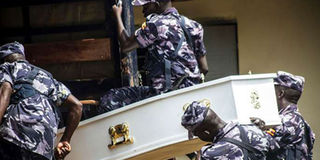Victims of clashes in Uganda buried

Soldiers carry the body of a policeman killed during the last weekend clashes between security forces and royal guards of King Charles Wesley Mumbere of the Rwenzururu kingdom, prior to his funeral on November 30, 2016 in Kasese. Fifty one were buried on December 4, 2016. PHOTO | AFP
What you need to know:
- They were among nearly 90 people killed in fighting last month between palace guards of a tribal monarch and security forces in the western region.
- The government accused Rwenzururu King Charles Wesley Mumbere of stoking a secessionist rebellion and stormed his palace on November 27.
KAMPALA
The bodies of 51 unidentified victims of fierce fighting in a local kingdom in Uganda's restive Kasese region have been buried in a mass ceremony, officials say.
They were among nearly 90 people killed in fighting last month between palace guards of a tribal monarch and security forces in the western region, said Kasese district official Geoffrey Sibendire Bigogo.
"No relatives had turned up to claim them .. It is a painful exercise but we had no way out," he told AFP.
"The bodies were rotting away and the stench is unbearable considering such (a) high number."
The government accused Rwenzururu King Charles Wesley Mumbere of stoking a secessionist rebellion and stormed his palace on November 27, a day after his palace guards attacked local officers, according to police.
The local monarch was taken to the capital Kampala where he was charged with murder.
The death toll from the clashes stands at 87, although local reports suggest the real number could be more than 100.
Ugandan government and local authorities agreed to Sunday's mass burial, but ordered DNA samples to be taken from every corpse to attempt to identify them later.
"Each of the dead has been buried in separate grave so that once relatives show up the bodies can be exhumed," said Bigogo.
SEPARITISTS
Explaining why so many bodies were not identified, he said: "Some of the bodies were burnt beyond recognition during the raid at the palace."
Another local official, Alex Byamugisha, said: "We may never know how many people could have died as security barred us from accessing the sites where clashes took place."
Kampala alleges that kingdom hardliners want to secede and establish an independent state they call the Yiira Republic that would include a part of neighbouring Democratic Republic of Congo, whose people share the same culture and language as the local Bakonzo.
Before being recognised as a traditional kingdom in 2009, Rwenzururu had a long history as a separatist movement, and the government said a trained, armed militia had set up camp in the palace and surrounding Rwenzori mountains.





